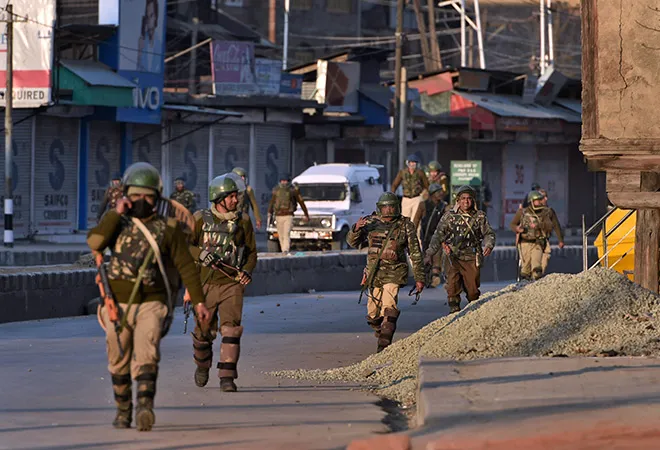-
CENTRES
Progammes & Centres
Location

Image Source: PTI
When corruption is well established in any state, it not only undermines the state institutions and their authority but also creates widespread anguish and anger among the masses. When left unaddressed for decades together, it creates an unstable environment that is susceptible to disturbance triggered by internal as well as external factors. The state institutions lose the trust of their citizens. The traditional forms of societal control get eroded. In conflict zones especially, acute corruption deprives the poor and vulnerable masses of essential services. They are subjected to constant fear and extortion, while the situation is exploited for their own gains by the rich, influential and the political elite. Corruption, when thus institutionalised in a conflict zone, contributes to and becomes a prominent factor in social unrest and insurgency, eventually becoming a tool in the hands of terror organisations and transnational organised crime networks.
The impact of rampant corruption and nepotism in Jammu and Kashmir (J&K) – one of the world’s hottest conflict zones – is now being felt in other parts of India, clearly indicating that it is not merely a problem confined to the border State, but has emerged as a threat to national security. The recent “fake arms licences case”, involving almost six States across India, is a testimony to this dangerous phenomenon. These fake licences can easily be used by terror organisations across India for target killings and any other civilian casualties.
The case was unearthed when Rajasthan government’s Anti-Terror Squad (ATS) arrested three arms dealers — Rahul from Jammu, Vishal from Abohar in Punjab and Zubair Khan from Ajmer on 11 September 2017. The three were accused of supplying fake arms licences to customers in Rajasthan, Gujarat, New Delhi, Madhya Pradesh and Uttar Pradesh. As per the evidence with the Rajasthan ATS, 4.29 lakh fake licences were issued from Kupwara, Baramulla, Kathua, Ramban, Udhampur and Jammu districts of the insurgency-hit State. ‘Operation Zubeida’ was launched by Rajasthan ATS to probe into the inter-State racket that sold fake licences from J&K to other parts of the country. The operation resulted in the recovery of 100 fake arms licences and a huge cache of weapons during raids at 12 locations in five aforementioned states.
Despite repeated attempts, the ATS has been denied access to official records by the J&K government, which, by itself, too, has failed to take any action against those involved. A communique issued by the J&K State home department to the Rajasthan ATS simply reads, “as regards to the incumbency charts of the officials posted in the Arms section since 2001, it is informed that as per the concerned sections, all records were washed away during the 2014 floods”. The investigation has been repeatedly stalled by the officials in the J&K government under such excuses.
The probe into the case got momentum when on 10 July 2018, the elder brother of a Kashmir cadre IAS officer was arrested from Gurgaon. It was the 52nd arrest in the case in the past one year. The Rajasthan government has written to J&K home department suggesting “transfer of the case to the CBI without any further delay,” citing it as a threat to national security. Senior officials of Rajasthan ATS have reportedly gone on record stating that the details of this case were never shared by the then J&K Chief Secretary, B B Vyas, despite repeated intimations. The only official response from the J&K government – which appears more like a lame excuse – was that the records have been washed away in the floods of 2014, and is therefore, suspect.
Following the establishment of the Governor’s rule in J&K in June, the government finally took cognisance of Rajasthan ATS’ request and issued a notification on 12 July directing the divisional commissioners and deputy commissioners for detailed report of arms licences issued in 2017-18. The notification also asked the deputy commissioners concerned to submit the report within one month and barred the issuance of new licences till further order. Furthermore, the governor decided and directed all the district magistrates to revoke all the licences issued to individuals other than security personnel.
This fake gun licences were issued on the basis of forged documents submitted by agents who worked as accomplices of administrative officials of the J&K State by charging a fee of up to Rs four lakh. At a time when our brave soldiers are martyred on the border each day fighting Pakistan’s proxy war to save the nation from terrorists and terror related activities, the babus (administrators) in the J&K government are accused of selling national security.
On 9 August 2018, Delhi became the fifth State to launch investigations in this fake arms licence scandal. Other States which have already initiated enquiries are Rajasthan, Gujarat, Madhya Pradesh and Uttar Pradesh. The case has been handed over to the Delhi Special Police Establishment Cell. Finally, and thanks to the imposition of the Governor’s rule, the J&K government has given its consent to the Delhi Police to investigate and enquire into the “offences and attempts, abetment and conspiracies in relation to or in connection with the offences of case”.
New Delhi as well as the J&K government are equally responsible for the dillydallying in such a case which has direct and grave consequences on national security. New Delhi, following its policy of political appeasement, has institutionalised corruption in J&K from 1947 and failed to make the State accountable for its mis-governance.
One year since the cover on the “fake arms licences case” was blown, the ongoing police inquiry by multiple States and other investigating agencies are likely to only stumble upon distorted facts and no concrete evidence. The State officials have so far conveniently swept such matter of grave national security risk under the carpet by giving implausible reasons of official records being washed away in the floods of 2014. However, the fact, which nobody has highlighted so far, is that the districts from where this nation-wide scam was managed were never affected by the floods.
The scandal has thus once again highlighted strong institutional linkages and police-bureaucracy-criminal nexus when it comes to corruption and nepotism in J&K. The administration of the State and its institutions need to be overhauled if Kashmir is to be given any sense of good governance.
Corruption in J&K has undermined the trust of the Kashmiris in democracy and now poses a direct challenge to not only peace operations within the State but has now emerged as a looming national security threat. The case should be investigated on high priority as it is expected to open a Pandora’s Box of anti-national activities carried out through the deep set criminal nexus that has been the cause of alienation of the Kashmiri masses, especially its youth.
The views expressed above belong to the author(s). ORF research and analyses now available on Telegram! Click here to access our curated content — blogs, longforms and interviews.

Ayjaz Wani (Phd) is a Fellow in the Strategic Studies Programme at ORF. Based out of Mumbai, he tracks China’s relations with Central Asia, Pakistan and ...
Read More +